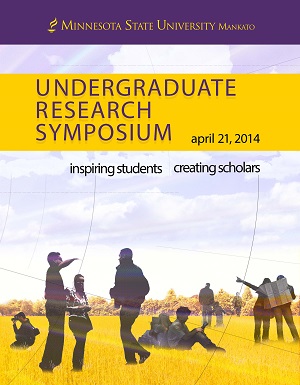Location
CSU Ballroom
Start Date
21-4-2014 2:00 PM
End Date
21-4-2014 3:30 PM
Student's Major
Psychology
Student's College
Social and Behavioral Sciences
Mentor's Name
Kathy Bertsch
Mentor's Email Address
kathy.bertsch@mnsu.edu
Mentor's Department
Psychology
Mentor's College
Social and Behavioral Sciences
Second Mentor's Name
Rachel Burlet
Second Mentor's Department
Psychology
Second Mentor's College
Social and Behavioral Sciences
Description
Social media sites are gaining popularity, giving teenagers a venue to anonymously post secrets, rants, and insults. Recently, anonymous high school related Facebook confession sites have emerged. These sites, while not endorsed by the school, often contain the school’s name, mascot and location creating a forum for anonymous social interactions among high school students. Facebook confession sites have gained attention over concerns about cyber bullying and the potential negative influence on the reputation of schools. The purpose of this study is to analyze the language of Facebook confession sites to determine the degree of positive and negative emotionality as well as to begin to understand the sudden popularity of anonymous high school social media sites. Facebook confession sites were gathered using key search terms and several common search engines. A list of fifty-four high school confession sites was created based on the criteria of having identifiable features of a specific United States high school. From this list, twelve confession sites were randomly selected for the analysis of posts occurring during a common 3 month time period. The Linguistic Inquiry and Word Count software program was used to code Facebook posts on twelve emotionality categories: swear words, social, work, positive emotion, negative emotion, anxiety, anger, sadness, body, health, sexual, and death. Results reveal the degree to which anonymous social media posts include negative versus positive emotionality and the degree to which these posts receive “likes” from other Facebook users.
Creative Commons License

This work is licensed under a Creative Commons Attribution 4.0 International License.
Included in
High School Students Tell All: Analyzing Facebook Confession Sites
CSU Ballroom
Social media sites are gaining popularity, giving teenagers a venue to anonymously post secrets, rants, and insults. Recently, anonymous high school related Facebook confession sites have emerged. These sites, while not endorsed by the school, often contain the school’s name, mascot and location creating a forum for anonymous social interactions among high school students. Facebook confession sites have gained attention over concerns about cyber bullying and the potential negative influence on the reputation of schools. The purpose of this study is to analyze the language of Facebook confession sites to determine the degree of positive and negative emotionality as well as to begin to understand the sudden popularity of anonymous high school social media sites. Facebook confession sites were gathered using key search terms and several common search engines. A list of fifty-four high school confession sites was created based on the criteria of having identifiable features of a specific United States high school. From this list, twelve confession sites were randomly selected for the analysis of posts occurring during a common 3 month time period. The Linguistic Inquiry and Word Count software program was used to code Facebook posts on twelve emotionality categories: swear words, social, work, positive emotion, negative emotion, anxiety, anger, sadness, body, health, sexual, and death. Results reveal the degree to which anonymous social media posts include negative versus positive emotionality and the degree to which these posts receive “likes” from other Facebook users.
Recommended Citation
Conrad, Chelsea. "High School Students Tell All: Analyzing Facebook Confession Sites." Undergraduate Research Symposium, Mankato, MN, April 21, 2014.
https://cornerstone.lib.mnsu.edu/urs/2014/poster_session_B/34



